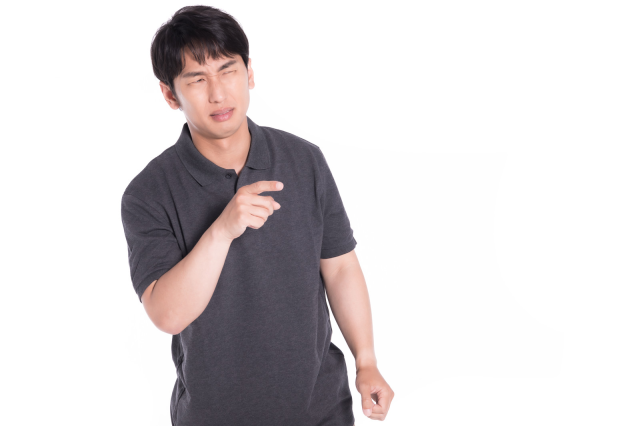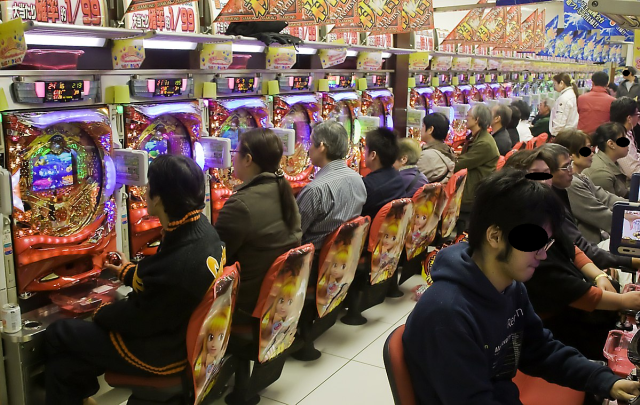
Politician wants people to know which businesses in one high-risk industry are ignoring warnings during the state of emergency.
Because of the way the Japanese legal system is structured, the government can’t actually order businesses to close or people to stay in their homes, and so there are still a surprising number of people out and about enjoying their normal leisure activities like there isn’t a deadly coronavirus pandemic going on.
While the people hanging out together in parks, playgrounds, and shopping centers are concerning enough, the even more unsettling business-as-usual sites are pachinko parlors. Poorly ventilated and sealed tight at their entrances/exits to prevent their constant blaring music and clouds of cigarette smoke from leaking out into the outside world, pachinko parlors’ entire business model is built on strangers sitting shoulder to shoulder for hours on end, manipulating sets of machine controls that countless other people have since the last time they were wiped down.
If those sound to you like the sort of conditions the coronavirus absolutely loves, Japanese politician Yasutoshi Nishimura shares your opinion. A member of Prime Minister Shinzo Abe’s cabinet, Nishimura spoke at a press conference on Tuesday about his frustration at how many pachinko parlors have ignore a government request to close down during the health crisis.
However, as mentioned above, Nishimura (whose positions include Minister of State for Economic and Fiscal Policy and Minister in charge Economic Revitalization) can only ask pachinko parlors to shut down, not force them. But something else he can do, he says, is publish a list of all pachinko parlors that are operating as normal, in hopes of shaming them into closing.
According to Nishimura, the same legislation that allows the government to request closures, the New Influenza Special Measures Law, includes a clause that grants officials the authority to publicly announce the names of businesses that, without a legitimate reason, are not complying with the closure request, and that he is looking into the procedure to do so. “Unfortunately, we are seeing cases of [pachinko parlors] not complying with the closure request, and of people coming from other cities/prefectures and gathering at [parlors] which remain open,” said Nishimura at the press conference.
On one hand, in a society where concepts of social obligation and good citizenship often exert as strong an influence on people’s behavior as the threat of fines or incarceration, the threat of being put on a list of shame for all to see could very well convince some pachinko parlors that it’s time to take a break until the health climate improves. On the other hand, though, making such information a matter of public record simultaneously creates a list of the remaining places where gamblers can still go to get their fix right now. Since some people have already shown they’re more worried about missing a jackpot than getting infected with the coronavirus can get their fix, that could create even bigger crowds at those parlors which stubbornly choose to stay open, so in the end there really is no easy answer, except for people to take it upon themselves to stay home.
Sources: Livedoor News/Tele Asa News via Jin, Mainichi Shimbun
Top image: Pakutaso
Insert images: Wikipedia/MichaelMaggs,
● Want to hear about SoraNews24’s latest articles as soon as they’re published? Follow us on Facebook and Twitter!


 Japan’s prime minster to declare state of emergency for Tokyo over coronavirus infections
Japan’s prime minster to declare state of emergency for Tokyo over coronavirus infections Why have no COVID-19 clusters occurred in pachinko parlors?
Why have no COVID-19 clusters occurred in pachinko parlors? Number of pachinko parlors in Japan decreasing rapidly, down 12 percent in two years
Number of pachinko parlors in Japan decreasing rapidly, down 12 percent in two years Japanese prime minister accidentally asked about government’s massive “Robbery Campaign” budget
Japanese prime minister accidentally asked about government’s massive “Robbery Campaign” budget Pachinko parlor has weird way of combating COVID-19 that does nothing about swarms of customers
Pachinko parlor has weird way of combating COVID-19 that does nothing about swarms of customers Potama serves up epic rice balls like no other, and there’s only one store in Tokyo
Potama serves up epic rice balls like no other, and there’s only one store in Tokyo Tokyo street sweets: The must-snack treats of Nakano’s Refutei
Tokyo street sweets: The must-snack treats of Nakano’s Refutei Japan’s craziest burger chain takes menchi katsu to new extreme levels
Japan’s craziest burger chain takes menchi katsu to new extreme levels New smartphone game turns car models into anime girls with model-worthy looks
New smartphone game turns car models into anime girls with model-worthy looks We spend Culture Day in prison, food was arguably better than Yoshinoya
We spend Culture Day in prison, food was arguably better than Yoshinoya McDonald’s Guarantees Your Order in 60 Seconds or You Get a Free Burger, Employs Actual Hourglass
McDonald’s Guarantees Your Order in 60 Seconds or You Get a Free Burger, Employs Actual Hourglass Japan Extreme Budget Travel! A trip from Tokyo to Izumo for just 30,000 yen [Part 2]
Japan Extreme Budget Travel! A trip from Tokyo to Izumo for just 30,000 yen [Part 2] How to make a lucky sushi roll with KFC fried chicken skin【SoraKitchen】
How to make a lucky sushi roll with KFC fried chicken skin【SoraKitchen】 Say hello to Japan’s new stationmaster cat!【Video】
Say hello to Japan’s new stationmaster cat!【Video】 Starbucks Japan releases first-ever Hinamatsuri Girls’ Day Frappuccino
Starbucks Japan releases first-ever Hinamatsuri Girls’ Day Frappuccino Japanese restaurant chain serves Dragon Ball donuts and Senzu Beans this spring
Japanese restaurant chain serves Dragon Ball donuts and Senzu Beans this spring Highest Starbucks in Japan set to open this spring in the Tokyo sky
Highest Starbucks in Japan set to open this spring in the Tokyo sky Tokyo Skytree turns pink for the cherry blossom season
Tokyo Skytree turns pink for the cherry blossom season Japan Extreme Budget Travel! A trip from Tokyo to Izumo for just 30,000 yen [Part 1]
Japan Extreme Budget Travel! A trip from Tokyo to Izumo for just 30,000 yen [Part 1] Yakuzen ramen restaurant in Tokyo is very different to a yakuza ramen restaurant
Yakuzen ramen restaurant in Tokyo is very different to a yakuza ramen restaurant Japan has only one airport named after a samurai, so let’s check out Kochi Ryoma【Photos】
Japan has only one airport named after a samurai, so let’s check out Kochi Ryoma【Photos】 Japanese drugstore sells onigiri at pre-stupid era prices, but how do they compare to 7-Eleven?
Japanese drugstore sells onigiri at pre-stupid era prices, but how do they compare to 7-Eleven? Adorable Totoro acorn key holders come with a special guest hidden inside[Photos]
Adorable Totoro acorn key holders come with a special guest hidden inside[Photos] Japan’s newest Shinkansen has no seats…or passengers [Video]
Japan’s newest Shinkansen has no seats…or passengers [Video] Starbucks Japan releases new sakura goods and drinkware for cherry blossom season 2026
Starbucks Japan releases new sakura goods and drinkware for cherry blossom season 2026 Foreigners accounting for over 80 percent of off-course skiers needing rescue in Japan’s Hokkaido
Foreigners accounting for over 80 percent of off-course skiers needing rescue in Japan’s Hokkaido Super-salty pizza sends six kids to the hospital in Japan, linguistics blamed
Super-salty pizza sends six kids to the hospital in Japan, linguistics blamed Starbucks Japan unveils new sakura Frappuccino for cherry blossom season 2026
Starbucks Japan unveils new sakura Frappuccino for cherry blossom season 2026 Foreign tourists in Japan will get free Shinkansen tickets to promote regional tourism
Foreign tourists in Japan will get free Shinkansen tickets to promote regional tourism The 10 most annoying things foreign tourists do on Japanese trains, according to locals
The 10 most annoying things foreign tourists do on Japanese trains, according to locals Take a trip to Japan’s Dododo Land, the most irritating place on Earth
Take a trip to Japan’s Dododo Land, the most irritating place on Earth Naruto and Converse team up for new line of shinobi sneakers[Photos]
Naruto and Converse team up for new line of shinobi sneakers[Photos] Is China’s don’t-go-to-Japan warning affecting the lines at a popular Tokyo gyukatsu restaurant?
Is China’s don’t-go-to-Japan warning affecting the lines at a popular Tokyo gyukatsu restaurant? Survey asks foreign tourists what bothered them in Japan, more than half gave same answer
Survey asks foreign tourists what bothered them in Japan, more than half gave same answer Japan’s human washing machines will go on sale to general public, demos to be held in Tokyo
Japan’s human washing machines will go on sale to general public, demos to be held in Tokyo Starbucks Japan releases new drinkware and goods for Valentine’s Day
Starbucks Japan releases new drinkware and goods for Valentine’s Day We deeply regret going into this tunnel on our walk in the mountains of Japan
We deeply regret going into this tunnel on our walk in the mountains of Japan Studio Ghibli releases Kodama forest spirits from Princess Mononoke to light up your home
Studio Ghibli releases Kodama forest spirits from Princess Mononoke to light up your home Major Japanese hotel chain says reservations via overseas booking sites may not be valid
Major Japanese hotel chain says reservations via overseas booking sites may not be valid Put sesame oil in your coffee? Japanese maker says it’s the best way to start your day【Taste test】
Put sesame oil in your coffee? Japanese maker says it’s the best way to start your day【Taste test】 No more using real katana for tourism activities, Japan’s National Police Agency says
No more using real katana for tourism activities, Japan’s National Police Agency says Japanese government freezes inbound air reservations for foreign residents and Japanese citizens
Japanese government freezes inbound air reservations for foreign residents and Japanese citizens Police with batons patrol Kabukicho, tell people to go home during coronavirus crisis【Video】
Police with batons patrol Kabukicho, tell people to go home during coronavirus crisis【Video】 No mask, no ride – Japanese government allows taxis to refuse to pick up maskless passengers
No mask, no ride – Japanese government allows taxis to refuse to pick up maskless passengers Internet cafes in Tokyo now closed due to coronavirus, but what about those who live in them?
Internet cafes in Tokyo now closed due to coronavirus, but what about those who live in them? Government plan has everyone talking about a 17-day-long New Year holiday
Government plan has everyone talking about a 17-day-long New Year holiday Japanese landlord’s touching gesture to tenants during coronavirus crisis goes viral
Japanese landlord’s touching gesture to tenants during coronavirus crisis goes viral Japanese prefectural government passes video game ban limiting kids’ daily play, smartphone time
Japanese prefectural government passes video game ban limiting kids’ daily play, smartphone time Japan to begin accepting tourists from the U.S., three other countries this month
Japan to begin accepting tourists from the U.S., three other countries this month Politician’s disgusting mask gaffe grosses out Japan【Video】
Politician’s disgusting mask gaffe grosses out Japan【Video】 Harajuku looks eerily quiet during the coronavirus outbreak 【Photos】
Harajuku looks eerily quiet during the coronavirus outbreak 【Photos】 What state of emergency? People in Tokyo defy requests to stay home during coronavirus outbreak
What state of emergency? People in Tokyo defy requests to stay home during coronavirus outbreak Japanese PM asks schools around Japan to close as coronavirus cases rise
Japanese PM asks schools around Japan to close as coronavirus cases rise Coronavirus vaccinations finally begin in Japan【Video】
Coronavirus vaccinations finally begin in Japan【Video】 Japanese government may encourage people to reuse masks as coronavirus-caused shortage continues
Japanese government may encourage people to reuse masks as coronavirus-caused shortage continues Japanese restaurant from the Edo Period forced to close due to coronavirus pandemic
Japanese restaurant from the Edo Period forced to close due to coronavirus pandemic